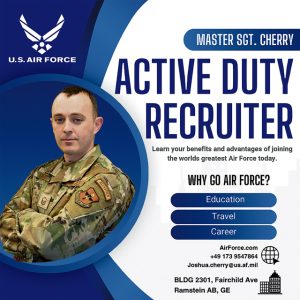
What is the difference between an in-service recruiter and an active duty recruiter?
An active duty recruiter’s job is to recruit, mainly, non-prior service members into the active duty Air Force. An in-service recruiter’s job, however, is to ensure active duty members know about their options for continued service after separating active duty and act as a separation advisor.
Additionally, the in-service recruiters here also support non-prior service members wanting to join the Air Force Reserves as well.
What are the differences between the Air National Guard and the Air Force Reserve?
The Air National Guard is a state entity that is primarily state funded, however can be called upon for federal missions, while the Air Force Reserves is a federal entity. The Air Force Reserve’s primary mission is to support active duty and offset different imbalances that they may have so we carry, for the most part, the same mission sets as active duty does. The National Guard’s primary mission is to support the state.
What is Palace Front?
Palace Front is when a member completes their entire active duty service obligation and the next day they enter the Air Force Reserves.
What is Palace Chase?
Palace Chase is when a member is leaving active duty early, and they are asking to curtail their contract and go to the guard or reserve. For Palace Chase, if a member is approved, they will have to give the Air Force Reserves or Air National Guard two times their remaining time on active duty for the enlisted and three times remaining active duty service commitments for the officer side. So the member is going to incur a new ADSC through the reserve going through that program. Active duty service members are eligible for the Palace Chase program when they have completed two-thirds of their initial service commitment.
Can you cross train in the Air National Guard and Air Force Reserve?
Service members do not have to stay in the same Air Force Specialty Code. The reserve can cross train people much easier than on active duty, according to Master Sgt. Zach Nusbaum, 351st Recruiting Squadron. They do not have to go through any additional organizations making it faster and easier to start the process. Nusbaum’s office is the cross train authority for Ramstein active duty service members looking to go reserve.
What are some benefits of going to the Air Force Reserve from Active Duty?
In the last year or two, every enlisted Airman has got a bonus if they stayed in their AFSC. Additionally, members who do not live next to a base can participate in individual mobilization augmentee programs where the Air Force pays for travel. If the member does travel again, enlisted only will reimburse up to $500 round trip for service members to participate in these programs.
Reduced health care prices and pensions can also be driving incentives when choosing to continue serving through the guard or reserve.
Frequently Asked Questions:
What is basic training like?
Basic Military Training is the first of three steps for your military career. It is a place where recruits are going through 7 weeks of training before technical schools.
“You get told what to do, where to be, and how you are often wrong in the hopes of improving trainees mentally, physically and helping them become more disciplined,” said Master Sgt. Joshua Cherry, 319th Recruiting Squadron Europe Operations Recruiting Program manager. “Everyone will handle Basic Military Training differently, but the goal is to shape you into an Airman.”
How can members learn more information on joining the guard or reserve?
Both Air Force Reserve or Air National Guard In-Service Recruiters have a recorded brief as part of the Transition Assistance Program. They also host a briefing on the second Monday of every month at 1 p.m. through Herc University. Additionally, they can brief squadrons upon request.
The information in this article was provided by Master Sgt. Zach Nusbaum, 351st Recruiting Squadron in-service recruiter, and Master Sgt. Joshua Cherry, 319th Recruiting Squadron Europe Operations Recruiting Program manager.


